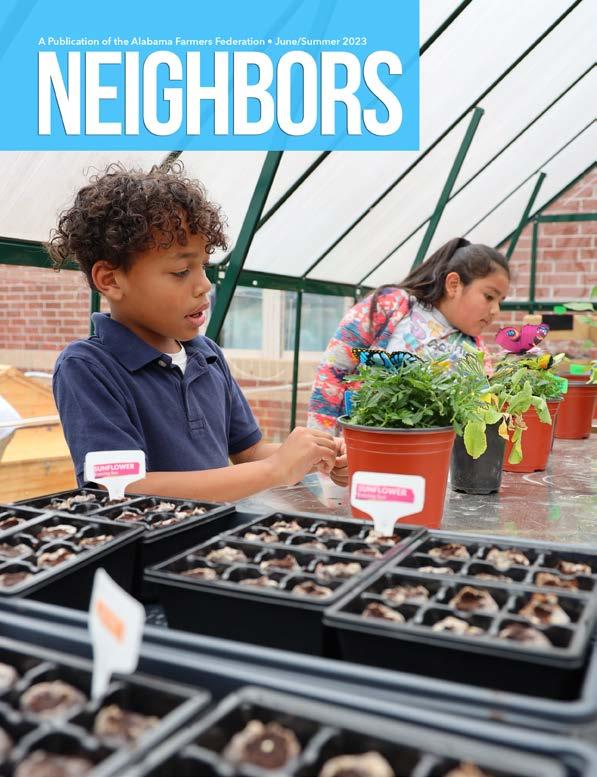
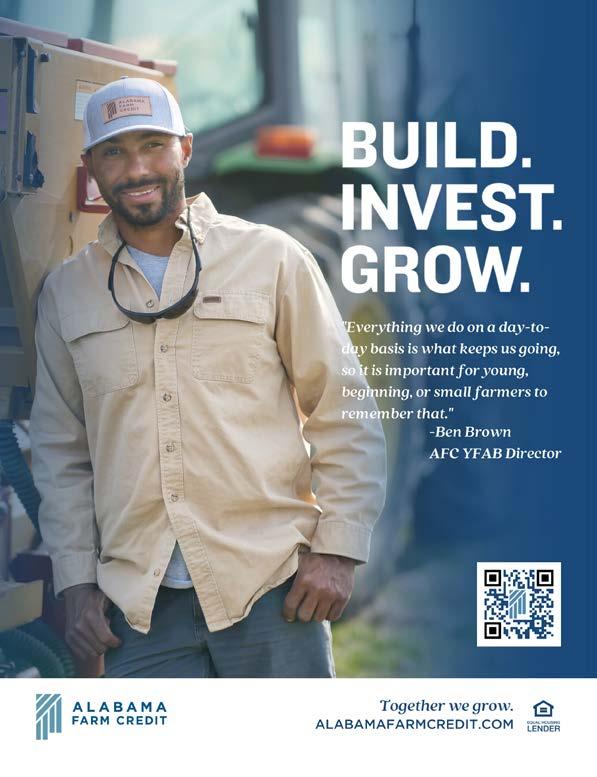
June/Summer 2023 | Volume 48 | Number 5
Marlee Jackson | Editor
Laura Unger | Graphic Designer
ALABAMA FARMERS FEDERATION

Paul Pinyan Executive Director
Jeff Helms | Director of Communications
FEDERATION OFFICERS
Jimmy Parnell | President, Stanton
Rex Vaughn | Vice President | North, Huntsville
Jon Hegeman Vice President | Central, Anniston
George Jeffcoat Vice President | Southeast, Gordon
Jake Harper | Vice President | Southwest, Camden
Steve Dunn Secretary-Treasurer, Evergreen
DIRECTORS
Dorman Grace | Jasper
Jeff Peek | Athens
John Bert East Leesburg
Steve Lake | Vinemont
Joe Anders Northport
Phillip Hunter | Birmingham
Joe Lambrecht | Wetumpka


Tommy Martin | Moundville
Bill Cook Montgomery
Trip Horne | Louisville
Mark Kaiser | Daphne
Thomas Adams Newville
Ann Whatley | Opelika
Jonathan Edgar Wetumpka
Neighbors (ISSN 0162-3974) is published monthly by the Alabama Farmers Federation, 2108 East South Boulevard, Montgomery, Alabama 36116 or (334) 288-3900. For information about Alabama Farmers Federation member benefits, visit the website www.alfafarmers.org. Periodicals postage paid at Montgomery, Alabama, and additional mailing offices.

Printed in the U.S.A.
15 |
POSTMASTER
Send address changes to Neighbors
P.O. Box 11000, Montgomery, Alabama 36191-0001
MEMBERSHIP AND SUBSCRIPTION CHANGES
800-392-5705, Option 4 or BWatkins@alfafarmers.org
ADVERTISING REPRESENTATIVE
Ben Shurett, (256) 997-7922 BenShurett.alfafarmers@gmail.com
DISCLAIMERS: Advertisements in Neighbors do not represent an endorsement by the magazine or Alabama Farmers Federation. Editorial information from sources outside the Alabama Farmers Federation is sometimes presented for our members. Such material may, or may not, coincide with official Alabama Farmers Federation policies. Publication of information does not imply an endorsement by the Alabama Farmers Federation. www.AlfaFarmers.org

A member of American Farm Bureau Federation
EDQM 4 In This Issue
Students Explore Ag at Sumter County Farm Day
Farmers Shift Business Models to Stay Profitable
4 |
6 |
Guest Workers Vital as Labor Pool Shrinks
12 |
Five Things to Know About Alabama Young Farmers
Master Gardener Helpline Offers Quick Answers
On The Cover Ag in the Classroom mini grants help students, like those at Foley Elementary School, get firsthand experience with agriculture. Applications for the annual grant program open this fall.
25 |
18
Edwards
| Fresh Produce Packs Punch in Southern Bite Recipes
alfafarmers.org June/Summer 2023 | NEIGHBORS | 3
Photo By Maggie
28
28 15
Sumter County Farm Day Puts Learning in Students’ Hands

 By Jeff Helms
By Jeff Helms
Class, class, class!”
Elizabeth Allen summoned the attention of third graders from University Charter School (UCS) as they huddled under a sprawling oak at Micky and Lolita Smith’s Sumter County farm in late April.
“Yes, yes, yes!” echoed students
as they began a day of hands-on exploration and learning.
“I grew up on the farm and want to share this experience with my students,” said Allen, who organized the first farm day six years ago during her teaching internship. “They are learning about agriculture and the natural resources in our area, as well as potential job opportunities.”
To make the farm day a reality, Allen solicited help from friends and family, including the Sumter County Farmers Federation, church members and her father, Allen Waddell, who grazes cattle on the Smith family’s farm.
“My dad helps me identify a research project for the class each year that has impact on the local community,” she said.
Past projects ranged from trapping feral hogs to reducing pollution. This year’s topic was fly control in cattle. Teams presented posters highlighting the effectiveness of fly repellent options, from dust and spray to ear tags and supplement blocks.
“I love getting to see their projects come to life and have them present what they researched,” Allen said. “It’s completely student-led. I hand the
For six years, University Charter School third graders have gotten an up-close look at agriculture, including timber, cattle and hay, in Sumter County during the school’s annual farm day.
project over to them, and they do the work. I love seeing the light bulb come on as they work together and discuss a problem my dad is facing on the farm.”
In addition to presenting projects, students heard about farm commodities and local history from Sumter County Women’s Leadership Committee Chair Sara Buck and member Lolita Smith.
“They love it,” Smith said. “Some of these kids have never been out on a farm. They love being out here looking for deer and hog tracks and wild onions. It’s like they’ve never been outside.
“They’ll get on that cattle trailer, and we’ll go down and watch the timber being harvested. Then, we go over to the cattle pen and run the children through the chute. When they come out, I give them a big pretend shot. We go feed the cattle and end the day with a fossil hunt and sack race.”
Smith said the farm day encourages students to develop greater curiosity
To help students learn about real, on-farm cattle care, Lolita Smith gave them a pretend shot after the third graders ran through a cattle chute.
4 | NEIGHBORS | June/Summer 2023 alfafarmers.org
about the world.
“I just want them to observe and learn,” she said. “Anywhere you go, you can glean so much knowledge, and I don’t feel like kids get to do that as much these days.”
Adleigh Reed and Seth Reece, both 8, agreed their favorite part of the day was learning to determine a pine tree’s age by counting rings with Zane Winfield of Southern Logging.
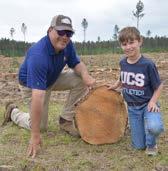
“We learned trees are used to make toilet paper, paper towels and napkins,” Reed said.

Reece added, “I didn’t know anything about farming until I came here today.”
Reed and Reece are among 50 third graders at UCS, which opened in 2018. The Smiths’ late son, Justin, was instrumental in establishing the rural charter school, and Micky, a professor emeritus of mathematics at the University of West Alabama (UWA), serves as board chair.
Waddell said the farm day is one way UCS teachers like his daughter make learning relevant and fun.
“If you told me seven years ago we’d
be doing this, I’d never have believed it,” he said.

When asked how he feels seeing Allen share her love of farming with students, his emotion was evident.
“You can’t put that into words,” he said.

As for Allen, the former UWA cheerleader doesn’t plan on hanging up her rubber work boots anytime
soon. She’s attending her first Ag in the Classroom Summer Institute this month and hopes to bring back lessons to help students grow their appreciation of farming and forestry.
“I just want them to experience life on the farm,” she said, “and hopefully understand more about where our food comes from.”
Third graders learned to gauge a tree’s age by counting its interior growth rings with Zane Winfield of Southern Logging.
alfafarmers.org June/Summer 2023 | NEIGHBORS | 5
Students annually research a production agriculture issue before the farm day and present findings to each other. This year’s topic was fly control in cattle.
Farmers Shift Shift Business Models to Stay Profitable
Tight margins and changing landscapes are causing Alabama farm families to make tough calls — sell out, scale back or switch commodities.
In Lamar County, the Gilmer family is shifting gears in the cattle business, trading in their 70-year-old milking parlor for greener pastures dotted with beef cattle.
“We had to transition from crops to dairy a long time ago, so we knew we could transition again,” Will Gilmer said. “My father, David, and I saw with the size of our farm and our strengths and weaknesses that the best thing for our long-term stability was to exit the dairy business. Based off our land resources, we decided we were best suited for beef production.”
With fewer local bottling plants and other economic shifts, Gilmer followed

in the steps of hundreds of dairymen. The Gilmers milked their last cow Feb. 27.

The declining dairy industry is heavily centered around supply chain issues, said Alabama Farmers Federation Dairy Division Director Colton Christjohn. There are just 16 dairies in Alabama.

“Some farmers are combating industry issues by producing more value-added products and bottling their own milk to capitalize on local markets in their area,” Christjohn said. “But many
have had to sell their cattle and pivot their farm to stay in agriculture.”
The Gilmers began to transition their farm model five years ago.

“Over that time, we decided, from an economic standpoint, the best way would be to breed our dairy cows to beef bulls,” Gilmer said. “We are raising those calves with hopes that, over time, our beef herd will come from within.”
The father-son duo has gone from milking 230 head of dairy cattle to raising 250 beef cattle. But it’s far from the first time the farm switched gears.
6 | NEIGHBORS | June/Summer 2023 alfafarmers.org
Top: Pastures of beef cattle fill the Gilmer family farm as their business model transitions away from dairy production. Above: The final day of milking brought an array of emotions to the Gilmer family. From left are Linton, David, Jillian and Will Gilmer. The last load of dairy cows left the Lamar County farm Feb. 27.
“The land we farm now belonged to my great-grandfather’s father-in-law. He started as a family farmer who grew corn and cotton as cash crops,” said Gilmer, the Lamar County Farmers Federation president. “In 1950, my grandfather realized this farm wasn’t suited for crop production by modern standards. He made the decision to transition our farm business model into the dairy industry.
“It’s going to be an adjustment not seeing those black and white cows out on pasture. This farm existed as a farm before we were a dairy. To keep the farm viable and give it a chance to thrive in the future, we had to make this transition to beef, no matter what learning curves it presents.”
A business model change is more than saying farewell to a milking parlor and black and white Holsteins. The Gilmers are changing breeding plans, genetics and daily operations.
“We have been set up on a dairy calving schedule, which means calves born nine months out of the year. That is


not ideal for beef. We are tightening our breeding and calving windows,” Gilmer said. “Our biggest challenge is getting everything consolidated.”
Farther north in Madison County, the Hubert family also realized changing a farm business model doesn’t happen overnight.
“I always wanted to do what my dad did. It became a thing I wanted to get back to,” said Seth Hubert, whose father was a row crop farmer before he died in 2003. “I went to Alabama A&M and finished my crop science degree.”
Despite land acquisition challenges, Hubert dreamed of diving into cash crops. He planted row crops in 2016, but urban sprawl and skyrocketing land rent prices soon convinced Hubert and wife Kaylee a change was needed if they wanted to pass the land to their children, Addie and Atlas.
“I was sitting on the front steps at my grandmother’s house watching Addie pick dandelions and realized that people have interest in U-pick flowers,”

Hubert said. “This is where the tulip farm got started.”
With a leap of faith, the Huberts bought their first tulip bulbs in the middle of the COVID-19 pandemic. The thousands of bulbs provided a profusion of color that attracted visitors from north Alabama and beyond.


Their prime position near Alabama’s fastest-growing city allows for a bounty of visitors to the farm during spring tulip season and summer sunflower season.
“This has allowed me to step away from my 9-to-5 and be on the farm full time,” Kaylee said. “The kids are here with me and Seth. This entire transition has been great for our family.”
Those tough decisions will hopefully pay dividends for generations, Kaylee said.
Federation Young Farmers Division Director Hunter McBrayer has seen farmers across the state fight to stay in agriculture. Ensuring farm profitability is a key priority of the Federation’s Young Farmers Division.
“Seth and Kaylee are great examples of how you can take a plunge and create a bright future for yourself and your family,” McBrayer said. “Farming isn’t easy, but it’s worth it.”
Gilmer agreed.
“In life and farming, some things you can only do for so long,” Gilmer said. “If you want to keep a future, then sometimes you have to make some tough decisions and changes. You must do what is sustainable for you.”
Seth and Kaylee Hubert welcome thousands of people each year to their Madison County Hubert Family Farms. The Huberts serve as ex-officio members of the Alabama Fruit & Vegetable Growers Association board and are pictured with their children, Atlas and Addie.
alfafarmers.org June/Summer 2023 | NEIGHBORS | 7
Thousands of visitors tiptoe through the tulips at Hubert Family Farms each year.

Judge Freezes Waters of U.S. Rule, Good News for Farmers
Alabama farmers applaud a recent U.S. District Court decision to halt the 2023 Waters of the U.S. (WOTUS) rule in 24 states, including Alabama. The April 12 ruling out of North Dakota followed a March 20 court decision to stop implementation in Texas and Idaho.

Alabama Farmers Federation’s Mitt Walker thanked Alabama Attorney General Steve Marshall for bringing the suit against the U.S. Environmental Protection Agency (EPA). Marshall and fellow attorneys general filed the suit Feb. 21.
“We appreciate Attorney General Marshall for taking action against the federal government’s blatant regulatory overreach,” said Walker, the Federation’s Governmental & Agricultural Programs Department director. “This ruling is a win in our fight for clear, concise rules based on the knowledge that farmers and landowners are wise stewards of the land.”
The current WOTUS dispute has now spanned three presidential
administrations, beginning with President Barack Obama. Marshall praised the courts for halting what he called “the Biden Administration’s latest power grab.”
“While the Clean Water Act granted the federal government important powers to regulate ‘navigable waters’ like rivers, the Biden Administration seeks to claim authority over even isolated ditches and ponds,” Marshall said. “But these local matters are reserved to the states, which are best equipped to manage them. Alabama, its farmers and landowners play a critical role in protecting our dynamic
and robust aquatic ecosystems, and managing local waters is their responsibility, not that of a bureaucrat in Washington.”
American Farm Bureau Federation President Zippy Duvall said further action is critical.

“With the rule now on hold in more than half the country, EPA and the U.S. Army Corps should do the right thing by listening to our legitimate concerns and rewriting the rule to draw a bright line of jurisdiction,” he said. “The rule creates a fuzzy, subjective assessment that’s unfair to landowners. All we’re asking for is a sensible rule that farmers can interpret without hiring a team of lawyers.”
States impacted by the April 12 ruling are Alabama, Alaska, Arkansas, Florida, Georgia, Indiana, Iowa, Kansas, Louisiana, Mississippi, Missouri, Montana, Nebraska, New Hampshire, North Dakota, Ohio, Oklahoma, South Carolina, South Dakota, Tennessee, Utah, Virginia, West Virginia and Wyoming.
alfafarmers.org June/Summer 2023 | NEIGHBORS | 9
Personal Service in Full Bloom with Alfa
By Brooke Foster
Florist Erica Honaker can testify that a rose by any other name would smell as sweet, but when it comes to insurance, a reliable brand matters.

Honaker’s Bloom — a floral design and gift shop in Pike Road — received an unwelcome visitor last January when a deer bounded through its windows. She soon found a shop in shambles wasn’t her only headache.

“I had the hardest time getting anyone from my insurance provider at the time to physically come out and assess the situation,” Honaker said. “Today, I tell everyone that making sure you’re insured with a company that is going to show up when you need them is a crucial step in owning your own business.”
While her then-provider was slow to respond, local Alfa Insurance Agent Jake Farmer showed Honaker a rosier side of customer service. Farmer, whose office is in the same shopping center, was one of the first people on the scene after the deer broke through Bloom’s storefront.
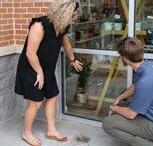
“The simple act of Jake showing up made me realize how important it is to be insured with a company that I can depend on,” said Honaker, who soon switched her business insurance to Alfa. “You hear claims from every company that they’re the best, but with Alfa, that’s actually true, and it’s because of people like Jake.”
Farmer said his quick response after hearing the clamor was instinctive.
“Something like this could happen to anyone at any time,” Farmer said. “I’m just glad Erica was OK and that I could be there to help.”
While most of Alfa’s deer claims deal with automobiles, the company is prepared for any incident, Farmer said. Alfa customers made more than 5,900 deer-related claims in Alabama in 2022, including 182 in Montgomery County.
“I’m proud to work for a company that treats not only its employees as family, but customers, too,” said Farmer, whose parents are both longtime Alfa employees. His father, Jeff, is the company pilot; his mother, Lisa, recently retired as vice president of Risk & Compliance.
Honaker has helped the Alfa family grow since last January, referring friends and family to the Alabama-based company. New customers include Taylor Skipper, whose salon is just two doors down from Bloom.

“As a small-business owner, I’ve always appreciated good customer service,” Skipper said. “After hearing of Erica’s positive experience with Jake, I decided to move my business to Alfa, too. It’s been the best decision.”
Farmer said he admires the tenacity of his small-business customers.
“That’s why it’s so important to work with someone you can trust,” Honaker said. “It’s nice to have someone like Jake explain all the fine print and details that come with an insurance policy and to also reassure me that if something like this happens again, he’s going to be there for me.”
Alfa Insurance President Jimmy Parnell said Farmer’s actions reflect the “Alfa Difference” — the company’s commitment to deliver on its promises and policies. That community-minded culture led Farmer to Alfa five years ago.
“They’ve worked hard to build their businesses from the ground up, and I am honored to be a small part of helping keep what means so much to them protected,” he said.
Today, Bloom’s “Pretty. Happy. Things.” neon signage means more than ever to Honaker, whose business has thrived since the deer disaster.
“Owning a business isn’t easy,” she said. “It comes with a growing list of challenges and, sometimes, heartbreak. But when you love what you do, it’s all worth it.”
For information about Alfa’s business insurance, visit AlfaInsurance.com. To view Bloom’s floral offerings, visit BloomPikeRoad.com.
10 | NEIGHBORS | June/Summer 2023 alfafarmers.org
From left: Bloom owner Erica Honaker assists local salon owner Taylor Skipper as she selects a flower arrangement; Honaker shows Alfa Insurance Agent Jake Farmer the area of her storefront where a deer caused extensive damage in January 2022; Farmer visits with Honaker in her Pike Road floral shop.

Guest Workers Essential to Alabama Agriculture
 By Marlee Jackson
By Marlee Jackson
Shouts of laughter blend with a medley of Spanish and English banter on a growing number of Alabama farms during busy seasons.
The lighthearted camaraderie is in sharp contrast to the dim future many farms face without the state’s 2,100 legal, seasonal guest workers.
“We wouldn’t have any help,” said Lance Byrd of Green Valley Farms in Montevallo. “We’d have to downsize, and we’d have to manage with the people we could get in a day and time where everyone is fighting for employment. This is a problem money

does not solve because people don’t want to do the work.”
While agriculture is flush with advancements and automation, intense hands-on work is necessary for many commodities. The monotonous labor often dissuades American workers from staying on the payroll — or attempting the work at all, said the Alabama Farmers Federation’s Blake Thaxton.
“The jobs our guest workers do take incredible skill and stamina,” said Thaxton, who represents specialty crop and green industry farmers. “Our farmers count on these guys to help them deliver a quality product to customers, whether that’s freshly picked
produce or ornamental plants.”
That’s particularly true for nursery and greenhouse agribusinesses like the Byrds’ in Shelby County.
Since the late ‘90s, the Byrd family has contracted with guest workers to pot, plant, prune and pack thousands of plants each year for their nursery. As the domestic labor pool shrank, the Byrds’ guest worker numbers grew. That statistic is reflected across America. National guest worker numbers more than tripled between 2012 and 2022, reaching over 350,000 last year.
But seasonal labor shortages aren’t a new problem.
Choices magazine, an agricultural economics powerhouse publication, reports agricultural labor scarcities reaching back to the 1940s. Federal program changes over the next four decades resulted in the 1986 Immigration Reform and Control Act, which divided seasonal guest workers into two categories — H-2A for agricultural work and H-2B for nonagricultural labor.
Before hiring H-2A guest workers, employers must prove the work is seasonal and that no U.S. workers are willing to perform the job.
The seasonal caveat is critical, Byrd said.
“There are four or five months where we don’t have as much to do because
12 | NEIGHBORS | June/Summer 2023 alfafarmers.org
Skilled guest workers are essential to Alabama farms, such as Green Valley Farms in Montevallo. The nursery has welcomed guest workers since the late 1990s to help with intense, hands-on work as the domestic labor pool has decreased.
it’s not the growing season,” he said. “Guest workers help because we don’t employ them during the down time. That’s when they go back home.”
This year, 17 Mexican workers arrived in Montevallo in February and will work through December. Many of the Byrds’ tight-knit crew are return workers with years of Green Valley experience, including two who attended Renee Byrd Fochtmann’s wedding 24 years ago.
“These guys show up and are not afraid to work hard,” Fochtmann said. “They’re consistent. They learn their trade here, and they come back, and they do it year after year. They’re family to us. They’re invested in what we do.”
Labor shortages and a declining
workforce. Nearly 3 million fewer Americans work outside the home since February 2020, the U.S. Chamber of Commerce reports.
The shrinking number of American workers underscores the H-2A program’s importance, said the Federation’s Mitt Walker.
“We’re not a huge state for H-2A, but those workers are critical to the Alabama farms where they work,” said Walker, who monitors national affairs, including labor issues, for the Federation. “Without a viable guest worker program, it would be difficult for our guys to stay in business.”
This is the first piece in a four-part series about Alabama’s need for guest workers. Read more in the September,
temporary, seasonal, nonimmigrant laborer who enters the U.S. legally to work a predetermined number of months on a specific farm for a set wage a program where U.S. employers legally hire foreign workers to fill temporary agricultural jobs for busy seasons like planting and harvest similar to H-2A but for nonagricultural jobs

It’s never a dull day on the farm. Since 1916, Alabama Ag Credit has helped farmers like you finance improvements and upgrades for everything from supplies to tractors to tools that get the job done. Whether you’re starting or expanding your agricultural operation, we o er long-term or short-term credit options. Call us today to learn about our competitive rates and how our relationship lending can help your farm thrive.
 The shrinking number of American workers underscores the importance of seasonal, legal H-2A program guest workers.
The shrinking number of American workers underscores the importance of seasonal, legal H-2A program guest workers.
ME M BE R Showing up for work before the sun does. n’ t get it, but we do. A l ab a m aAg C r e d i t . c o m Call 800.579.5471
alfafarmers.org June/Summer 2023 | NEIGHBORS | 13
Alfa® team members donate their time to serve others and grow relationships.

Communities are built by those who work TOGETHER.

alfafarmers.org June/Summer 2023 | NEIGHBORS | 15




























Contact your local Alfa Insurance agent and apply today! *Rates disclosed as Annual Percentage Rate (APR) and are subject to change without notice. APRs will vary with the market based on the Prime Rate. Introductory APR is applicable for first 9 months from account opening date. After that, your APR will return to the current rate indicated on your statement. If timely payments are not received, the introductory APR may end early. 1Eligible purchases mean any signature or pin-based, online, phone or mail-order purchase made with the Farm Bureau Member Rewards MasterCard. Offer excludes Cash Advances, Balance Transfers, credits and returns. Points expire after four full years. 3X reward points on qualifying transactions, up to $1500 quarterly. Program may change or be cancelled at any time. 2Instead of receiving a membership renewal notice, you will receive a letter notifying you that your dues have been paid. Based on purchases made in the calendar year that ends 60 days prior to membership renewal month. Balance transfers and cash advances are not included. Please see Terms and Conditions on farmbureau.bank for additional details about the Farm Bureau Member Rewards MasterCard. Banking services provided by Farm Bureau Bank, FSB. Farm Bureau, FB, and the FB National Logo are registered service marks owned by, and used by Farm Bureau Bank FSB under license from, the American Farm Bureau Federation. FBMRMC_9.2022 farmbureau.bank • 800.492.3276 0% Intro APR* on purchases1 for 9 months $100 Statement Credit when you spend $500 in the first 90 days 3X Earn triple points on Gas, Grocery & Dining purchases1 PAID Alfa Farmers membership dues when you spend $7,200 annually2 Tap & Go Contactless Payment Carrythecard that rewards Alfa Farmers membership! Farm Bureau® Member Rewards Mastercard® IT PAYS TO BE A MEMBER
Alfa Supports Technology in Rural Health Care
By Maggie Edwards
Partners from Auburn University (AU), Alabama Cooperative Extension System (ACES), the Alfa Companies and Chambers County gathered in LaFayette April 21 to dedicate one of four OnMed Care Stations in the U.S.



The walk-up telemedicine booth promises to give thousands of rural residents access to health care without traveling to the next county.
LaFayette City Fire Chief and Emergency Medical Services Director Jim Doody said the need for this project came to light when the COVID-19 pandemic began, noting there is not an urgent care or hospital in Chambers County.
“The fire station lobby ended up becoming the de facto medical clinic,” Doody said. “We knew we needed to improve our way of providing health care. This has been blood, sweat and tears for the last three years.”
A visit to the OnMed Station is simple: Walk in, press start, get an exam and walk out. A clinician appears on the screen within seconds of entering the station, which is the size of an office
cubicle. The innovative care-delivery company describes its virtual doctor visits as clean, private, accessible, affordable, secure and convenient.
OnMed is found inside the newly renovated Chambers County Community Health and Wellness Center, which offers exam rooms, virtual health screening and more.
Doody said he hopes to see this health clinic concept catch on in rural communities. OnMed now has locations in Alabama, Georgia, Florida and Texas.
“This can be done anywhere, but it benefits a lot of small towns,” he said. “The numbers of people who could be impacted are endless.”
OnMed Chief Commercial Officer Howard Gruverman said the health care station combines innovation and traditional medicine.
“You get all kinds of technology, such as a drop-down stethoscope,” Gruverman said. “We take your blood pressure, pulse, oxygen and weight. It can take thermography to see if you have an infection in your sinuses or check your temperature. We basically create a better patient experience, as well as a better clinic experience.”
Gruverman praised OnMed’s partnership with ACES and AU. AU
student nurses and pharmacists work at the Chambers County Community Health and Wellness Center. It’s a win-win, said AU’s Linda Gibson-Young.
“As a professor, we have undergraduate and graduate students we can bring into the community. We can connect them with other disciplines,” said Gibson-Young, an AU College of Nursing professor. “We can all work together to manage patients’ care using our expertise. Those students can now come into this environment and really connect with rural health.”
The building opens doors for families, patients, adults and the elderly to receive health care, she added.
Alabama Farmers Federation and Alfa Insurance partnered with Blue Cross Blue Shield, AU, ACES and Chambers County leaders to fund the OnMed Care Station.
“Our mission has always been to help folks in rural areas, whether in agriculture or family science,” said Federation Executive Director Paul Pinyan. “Health care is important. We need to bring this technology to rural communities so they can get the health care access they need.”
LaFayette’s OnMed Care Station is the first of its kind in Alabama. The innovative patient-care station helps rural residents virtually interact with health care professionals to receive treatment.
Above: A bevy of community leaders and partners helped dedicate a new rural health care clinic in LaFayette April 21.
alfafarmers.org June/Summer 2023 | NEIGHBORS | 17
Left: Auburn University College of Nursing professor Linda Gibson-Young praised the Chambers County Community Health and Wellness Center during its dedication.
Produce Towers
Mini Grants Bring Agriculture to the Classroom


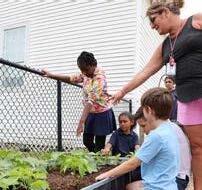

 By Maggie Edwards
By Maggie Edwards
As the school year wound down, dozens of students and teachers roamed the halls of Foley Elementary School (FES) proudly sporting shirts that read “STEAM.” FES gives a new meaning to the acronym which commonly stands for Science, Technology, Engineering, Art and Math — subbing out “art” with “agriculture.”
Teachers Shannon Keenan and Lisa Tidwell provide agriculture-filled lessons thanks to grants and teaching kits from Ag in the Classroom (AITC) and the Alabama Farmers Agriculture Foundation (AFAF). AITC Committee Chair Kim Earwood said it’s encouraging to see schools engaged with agriculture.
“We value educators who apply for and receive our AITC and AFAF mini grants,” Earwood said. “These grants are contributing to educators who teach
Raised-Bed Gardens
future farmers, agribusiness leaders, animal scientists, specialty crop farmers and more.”
The annual AITC Summer Institute allows educators like Keenan and Tidwell to gather ideas and learn how to implement agriculture into their curriculum. The FES STEAM teachers attended their first Summer Institute in 2021.
“What really started our ag journey was winning an egg incubator during that first conference,” Keenan said. “We currently have seven eggs in it now.”
She continued, “We went to Summer Institute our first year after finding out about it online. Now we go back as presenters to share with other educators.”
FES boasts an array of state-of-theart AITC projects. Lettuce towers, drones for checking produce and raised-bed gardens help students get their hands
Greenhouse
Ag-Focused Books
18 | NEIGHBORS | June/Summer 2023 alfafarmers.org
AITC Committee Chair Kim Earwood, left, talks with an FES student, right, about her work with the gardening towers. Students drive drones to check the progress and condition of crops in the towers. FES received three mini grants from AITC and AFAF during fall 2022, one being for gardening supplies.
dirty as they learn about Alabama’s No. 1 industry.
“I believe children need to know where their food comes from,” Keenan said. “Baldwin County is rich in agriculture, but still, a lot of them don’t understand that our community is an agricultural community.”
Thanks to the AITC mini grant program, which awards grants each December, FES received a chicken coop, gardening material for the greenhouse and supplies for raised-bed gardens.
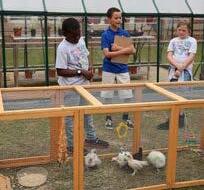
“We weren’t even doing agriculture before Summer Institute,” Tidwell said. “It planted the seed and gave us the opportunities to get these mini grants.”
Soil kits the teachers received during the 2022 Summer Institute help students dig into the possibilities of growing plants while at their desks.
But students find their most rewarding hands-on projects in the school courtyard as they drop their backpacks and put on a farmer’s mindset to test soil pH, fly drones or check lettuce towers.
The young leaders make a difference by donating produce to teachers for a locally grown lunch treat and supplying chickens to community members.
When asked why agriculture in the classroom was important, Tidwell’s answer was simple: Sustainability.
“We have to figure out how to sustain agriculture or we are going to be in trouble,” she said. “The kids don’t realize the connection of things they are doing to jobs that are actually out there and are available.”
Keenan and Tidwell have even recruited physical education teacher Amanda Daigle to their STEAM-focused studies.


“It is amazing combining PE and gardening,” Daigle said. “If anything in the garden needs to be done, my third graders and I will stop and go snip leaves, add soil or water plants.”

Daigle also runs the school garden club, which she started thanks to an AITC mini grant.
“Receiving an AITC mini grant fulfilled my dream of showing kids they can go from a tiny seed to something they can eat,” Daigle said. “Being able to bring them out and show them what one seed can produce is amazing.”
Earwood applauded FES’s work and commended similar programs across Alabama.

“My hope is for every educator in the state to involve themselves with projects like these so our children can see the world through an agricultural lens,” she said.
AITC mini grant applications open this fall and close Oct. 15 at alabamaaitc.org.
Soil Kits & Weather Egg Incubator
Chicken Coop
Drones
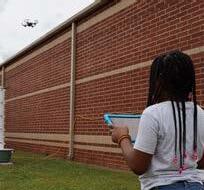 FES teacher Shannon Keenan will present interactive Ag in the Classroom activities to fellow educators during Summer Institute this month.
FES teacher Shannon Keenan will present interactive Ag in the Classroom activities to fellow educators during Summer Institute this month.
alfafarmers.org June/Summer 2023 | NEIGHBORS | 19
Using hands-on projects, STEAM teacher Lisa Tidwell teaches students about the abundance of career opportunities in agriculture.
2023 ANNUAL MEETING DATES, TIMES & LOCATIONS

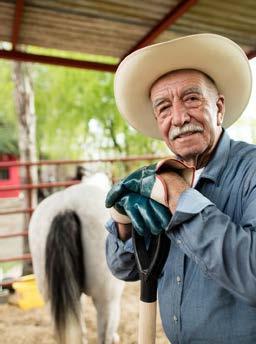
greathearingbenefits.com/farmbureau-al Great Hearing. Great Benefits. That Simple. As a member of the Alabama Farmers Federation, you have access to the Great Hearing Benefits (GHB) program. GHB provides family members access to hearing care and hearing aids at discounted rates. • Up to 50% below-MSRP pricing on today’s top hearing aid technology • Free 60-day trial. • 3-year warranty and service plan. • 4,500 nationwide locations for free hearing aid service or repair. • If your hearing aids are lost, stolen or damaged within the first three years, we’ll replace your hearing aids! • Share your benefits with up to three immediate family members. 25% OFFonJabra AudioProducts MemberSavingsStartat Call now to schedule your appointment 1 (877) 682-7837 County Date Time Location Address City Baldwin Thurs., Aug. 3 6:00 p.m. Baldwin County Farmers Federation 21332 Hwy. 59 Robertsdale Butler Thurs., July 20 5:00 p.m. Pioneer Electric 300 Herbert St. Greenville Coffee Mon., July 17 6:30 p.m. Community Room 1055 E. McKinnon St. New Brockton Colbert Mon., Aug. 28 6:30 p.m. Hospitality House (NW Shoals Community College) 800 George Wallace Blvd. Muscle Shoals Conecuh Mon., Aug. 14 6:00 p.m. The Depot 100 Depot Square Evergreen Elmore Tues., July 18 7:00 p.m. Wetumpka High School 1281 Coosa River Pkwy. Wetumpka Escambia Tues., Aug. 8 6:00 p.m. Camp 31 Restaurant 222 St. Joseph Ave. Brewton Fayette Tues., Aug. 15 6:30 p.m. Fayette Civic Center 530 Temple Ave. N Fayette Franklin Mon., Aug. 7 6:00 p.m. Best Western Hotel 13770 Hwy. 43 Russellville Henry Tues., Aug. 1 6:30 p.m. Wiregrass Research & Extension Center Auditorium 167 Hwy. 134 Headland Houston Tues., July 25 6:30 p.m. Alfa Service Center 1038 Ross Clark Cir. NE Dothan Lamar Mon., Aug. 14 7:00 p.m. Vernon City Complex 44425 Hwy. 17 Vernon Lawrence Tues., Aug. 1 6:00 p.m. Lawrence County Ag Center 13075 Hwy. 157 Moulton Madison Tues., Aug. 15 6:30 p.m. Huntsville Country Club 2601 Oakwood Ave. NW Huntsville Marion Fri., Aug. 11 6:00 p.m. Tombigbee Electric Cooperative 3196 Co. Rd. 55 Hamilton Mobile Tues., Aug. 15 6:30 p.m. Greater Gulf State Fair Grounds 1035 Cody Rd. N Mobile Pike Thurs., June 22 7:00 p.m. South Alabama Electric Cooperative 13192 Hwy. 231 S Troy Sumter Mon., July 10 7:00 p.m. Alfa Service Center 106 Marshall St. Livingston Tuscaloosa Tues., Aug. 15 7:00 p.m. Alabama Extension Office 2513 7th St. Tuscaloosa Wilcox Thurs., July 27 7:30 p.m. Gaines Ridge 933 Hwy. 10 Camden
20 | NEIGHBORS | June/Summer 2023 alfafarmers.org
Tips to Keep Tomato Plants Healthy

 By Mallory Kelley
By Mallory Kelley
The tomato is by far the most popular plant in the vegetable garden, but it can also be the most problematic. There are many things to watch for when growing tomatoes to ensure a healthy crop.
Plants are happiest if the leaves never get wet, so eliminate water on the foliage as much as possible with drip irrigation or hand-watering. If using an overhead sprinkler, water early in the morning so the sun will dry the foliage as soon as possible.
Pruning all lower limbs that are touching or near the surface of the soil will also help prevent fungal spores from splashing onto the leaves. Mulch creates a barrier between the plant leaves and the soil to help suppress many of the fungal spores that may splash onto the leaves from the ground. In addition, mulching plants will help the soil retain moisture and keep the plant’s moisture level more consistent. It also helps prevent blossom-end rot and suppress weeds. As the mulch breaks down, it adds organic matter to the soil. Remove yellow- and brown-spotted leaves as soon as they appear, as this indicates a fungal disease. Removing diseased leaves quickly will help stop the spread. If you haven’t already, start a fungicide application to prevent early blight. Nearly every tomato plant in the Southeast is going to get a fungal disease caused by Alternaria solani — but a preventative fungicide can help protect plants. Use products with the active ingredients chlorothalonil, mancozeb or copper.
Scouting daily for insects to catch the pests early is also a must. Then, accurate identification is the key to success.
The Alabama Extension smartphone app Farming Basics can help with identification and control. Familiarize yourself with the most common pests — armyworms, fruitworms, hornworms and stinkbugs.
Bacillus thuringensis (Bt) products are labeled organic. However, Bt products will only control worms in your garden. Apply early when the worms are small and actively feeding on the plants. The bacteria acts as a gut poison to the worm. If the worms are large before spotting them in the garden, it may be too late for sprays to be effective. More lethal products, like those that contain carbaryl, would be needed. Remember: Carbaryl is not selective like Bt, so it will kill a wide range of good and bad insects in a vegetable garden.
Other insects that like tomatoes are the stinkbug and leaf-footed bug. These can be very hard to control, so the best active ingredient in the home garden is bifenthrin. With any of these products, be sure to read the label and the post-harvest interval to learn how many days you must wait after application before picking and eating the fruit.
Weather challenges, garden insects, viruses, fungal problems, bacterial issues and disorders are all part of growing backyard tomatoes. If you have more questions about what may be affecting your tomato plants, call the Master Gardener Helpline at 1-877-ALAGROW (252-4769).
alfafarmers.org June/Summer 2023 | NEIGHBORS | 21
Tips to ensure a healthy garden-raised tomato plant include pruning lower limbs, eliminating water on foliage, scouting daily for insects and removing yellow or brown spotted leaves.
Youth Loans Give Young Generation Opportunities in Ag
he now rents to his parents’ and siblings’ herds.
FSA Youth Loans are available for youth between the ages of 10 and 20, with the requirement to pay the balance off within seven years. Abby, Cooper and Will pay down their loans once a year with money made from selling calves.
“A big takeaway from the loan is the importance of budgeting,” said Abby, who graduated from Susan Moore High School in May. “I had to set aside a certain amount from selling calves and prize money from cattle shows to help buy supplies. I also had to make sure I was set to cover my payments and put some into savings for college.”
Abby expanded her knowledge of the cattle industry through showing cattle at events such as the Jr. Livestock Expo, sponsored by the Federation.
“I learned that you can put a lot more money into farming than you make, but that’s OK because it is all for the greater good,” Abby said. “Less than 2% of the population are farmers, and it’s up to us to feed the entire world.”
By Maggie Edwards
Cattle, family and Farm Service Agency (FSA) Youth Loans have been the center of the Burgess family’s farm in Blount County for the past eight years.

“I am a 4-H Extension agent, and my main expertise is in youth development,” said Amy Burgess, an alumna of the Alabama Farmers Federation’s premier leadership initiative, Agricultural Leaders For Alabama. “I have worked with FSA Youth Loans for many years, signing off on lawn, swine and cattle projects. I knew that when my kids got older, we would take advantage of this opportunity. The FSA Youth Loans are a great way for
kids to get involved in an ag project, build their own credit and learn money management.”
Amy and husband James helped their oldest child, Abby, start the loan process when she turned 10. Abby, now 18, has since helped the family dive into Simmental cattle production using the maximum FSA Youth Loan amount of $5,000 to purchase better genetics and stock. Her brothers, 14-year-old twins Cooper and Will, followed in their sister’s footsteps at age 10, too — with a twist.
After getting the FSA-required recommendation from a local Extension agent, Cooper bought two bred cows and a bred heifer, while Will focused on entrepreneurship. He purchased a bull
Cooper also found a love for exhibiting cattle, raising a herd and spending long nights in the barn. He also used the Youth Loan program to help with his 4-H Pig Squeal project.
“’I’ve been around cattle my entire life,” Cooper said. “I never remember a time when I wasn’t. I make a lot of inconsistent money in the cattle business, with only selling so many times a year. I have to make money stretch.”
He added the financial and farming process offers great learning opportunities.
“It teaches you to roll with the punches, to persevere and how to handle money at a young age,” he said.
Burgess patriarch James didn’t grow up on a farm but has learned the intricacies of agriculture since marrying into a cattle-centric family. He said he
22 | NEIGHBORS | June/Summer 2023 alfafarmers.org
Amy and James Burgess of Blount County are passionate about cattle and youth involvement in agriculture. They combine those passions by using FSA Youth Loans to help grow their children’s herds. From left are Amy, Cooper, Abby and James Burgess. Cooper’s twin, Will, is not pictured.
enjoys seeing his children involved with youth projects.
“This project really forces the kids to make difficult decisions,” James said. “Their money is on the line. We were already raising cattle, but this loan gave them the chance to have skin in the game.”
James and Amy agree the FSA Youth Loan program has been vital to Abby, Cooper and Will’s growth — teaching them about agriculture, responsibility, hard work and how to be productive citizens.
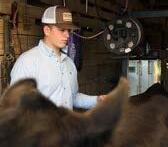
“This teaches them personal and financial responsibility,” James said.
Amy said another boon is her children are learning about the structure of government, the U.S. Department of Agriculture and its impact on farmers.
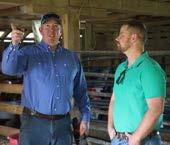

“This is an underutilized program of FSA,” Amy said. “A lot of parents are hesitant in getting their kids involved in animal agriculture because of the cost. This is a way to defer that cost to give young people time to work hard, earn money and pay it back.”

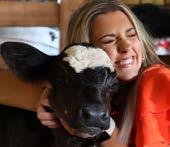
For more information about FSA Youth Loans, visit fsa.usda.gov.
Clockwise from top left: Abby Burgess spends time with her herd from the time they’re born to when they’re sent to the sale barn; Cooper Burgess said he enjoys the hands-on work of preparing show cattle; Cooper and Abby focus on preparing a show animal like they would before a big contest; James Burgess, left, visits with Federation Area 2 Organization Director Tyler Monday about the importance of FSA Youth Loans.
alfafarmers.org June/Summer 2023 | NEIGHBORS | 23


24 | NEIGHBORS | June/Summer 2023 alfafarmers.org
Call the Master Gardener Helpline
By Katie Nichols
What is that persistent weed growing in the flower bed? Why does it keep coming back? Why do these squash leaves look diseased? If that hydrangea bush is trimmed, will it still bloom? When is the best time to plant okra?
If you’re struggling to find these answers, give the Alabama Cooperative Extension System’s Master Gardeners a call. Available from 9 a.m. to 1 p.m. Monday through Friday, the Master Gardener (MG) Helpline is a one-stop shop for yard and garden troubleshooting.
Call 1-877-ALA-GROW
The toll-free helpline at 1-877-ALAGROW connects callers with a knowledgeable team of MG volunteers who can help answer the most pressing gardening questions. Armed with research and Alabama Extension publications, these volunteers can also contact specialists to find the answers gardeners need to help their gardens grow.
Mallory Kelley, a home grounds regional agent who oversees central Alabama’s helpline, said the program is a great example of Extension’s outreach mission. Volunteers from MG groups around the state work the phones answering questions. These questions run the gamut from vegetable gardens to bulbs and trees.
“The helpline has been in existence since 2006 as a statewide effort,” Kelley said. “We’ve always had helpline callers, but the pandemic really ratcheted up the need. Before, volunteers worked the helpline in March through August,
but now there is a need for Master Gardener expertise year-round.”
Kelley said the newest way to contact the MG volunteers is to submit a form at acesagmg.site. Users who submit a help request form with detailed information about issues in the yard or garden receive a prompt reply from MG volunteers manning the line.
Alabama Master Gardener Program
The Alabama Extension MG program was developed to increase the availability of home horticultural information through qualified volunteers and to improve communities through volunteer projects.
“The Master Gardener program is an example of partnership between land-grant universities Auburn University and Alabama A&M University and motivated volunteers interested in educating their communities,” Kelley said.
The program is based on the idea of shared ownership. Extension
staff and volunteers share ideas, visions, dreams and responsibilities for the program. To that end, volunteers have opportunities to work with Extension programs; federal, state and county agencies; and local schools and organizations. Many communities benefit from MG beautification projects and volunteers. MG volunteers also devote time to local schools and students.
Every volunteer contributes to the program’s success. They offer the community reliable gardening information and educational opportunities. Volunteers help in the county office or may provide an educational program for a civic group.
Master Gardener Helpline

Got home garden questions?
Call the Master Gardener Helpline at 1-877-ALA-GROW (252-4769).
Learn more about the Alabama Extension Master Gardener program by visiting aces.edu or contacting your local home grounds agent.
alfafarmers.org June/Summer 2023 | NEIGHBORS | 25
RAIN
It is raining. It has rained all day. My wife is making chicken soup because soup goes with rainy weather. It’s been a lazy, wet, boring, sleepy day. My wife has had the soup simmering since breakfast.
“The secret to good soup is plenty of time,” my wife told me earlier. “Time equals flavor.”
I liked that phrase so much I had to write it down on a legal pad. The same pad I am using to write you. I made a note to work in that clever sentence.
“Time equals flavor.” That’s good.
Anyway, my dogs have been cooped up because of the weather. Around 10, they went stir crazy and started a pro wrestling league in the den.
So I left for the quiet porch.
Only one week ago, I was in New York City. It rained downtown. It didn’t faze the city. Life kept moving. Horns kept honking. But here, a rain stops everything.
I can smell my wife’s soup from here. She made it from a chicken we bought from our friend, Lonnie. Lonnie is a strange hippie who names all his animals. Apparently, the chicken’s name was “Daisy."

My wife likes to know these things before she buys chicken. She likes to know the bird had a good life and, if possible, a Christian name.
Once, Lonnie tried to sell us a frozen chicken he had named “Mary.” My wife wouldn’t take it because Mary was her mother’s name.

I take a break from writing to read a book. It’s not high-brow literature. I’m a little embarrassed to tell you.
It is Minnie Pearl’s book of jokes. I’ve almost finished the entire thing on the porch today.
One joke is particularly good:

“A teacher wrote a sentence on the blackboard, which read: ‘I ain’t had fun all week.” The teacher said to her class, ‘How can I correct this sentence?’ A boy in the back stood and said, ‘Maybe you oughta get a boyfriend.’”
The smell of chicken soup is strong. Suppertime approaches, and I am getting hungry.
It’s past 5, and I still haven’t figured out how to use the phrase, “Time equals flavor” in this column.

The rain falls harder. It’s loud. I can hardly think, let alone write. The humidity has made the legal pad limp.
And I smell wet earth. Have you ever smelled a million acres of pine, saturated by Heaven? It smells as good as it sounds.
Some people associate rain with sad things, but the farming people I come from do not. No rural person would ever think badly of rain. Rain is a gift.
My wife shouts, “Soup’s ready!”
I stand to leave the porch. Before I go, I catch a glimpse of my legal pad.

One phrase reads: “God bless Minnie Pearl.”

Another sentence is underlined.
I was going to work my wife’s phrase into this column. But it’s raining too hard, and I’m feeling too lazy.
Maybe I could slap the sentence onto the final paragraph and hope it means as much to you as it does to me.
Because it’s true. All the things I have gone through, the ingredients of my life — the heartaches, triumphs, failures, victories — impart taste.
When they have simmered long enough, maybe one day I’ll find that no part of my life was without meaning. My experiences made me into me. Yours make you into you.
And make no mistake about it, we are great works of art. It just takes time.
Because time equals flavor. ■
26 | NEIGHBORS | June/Summer 2023 alfafarmers.org
Emergent Plus Membership: $19/month
Platinum Membership: $39/month
MASA MTS works hand-in-hand with benefits health plan administrators and transport companies to ensure you and your family have no out-of-pocket costs no matter which provider completes the ambulance transport within the continental United States, Alaska, Hawaii, and while traveling in Canada.
MASA MTS works hand-in-hand with benefits health plan administrators and transport companies to ensure you and your family have no out-of-pocket costs no matter which provider completes the ambulance transport within the continental United States, Alaska, Hawaii, and while traveling in Canada.
SCAN
QR CODE TO START

SCAN QR CODE TO START ENROLLMENT NOW:
ENROLLMENT NOW:
SOURCES: 1 HealthCareInsider, 2021 | 2 National Emergency Medical Services Assessment, 2020 | 3 FAIR Health, 2021 This material is for informational purposes only and does not provide any coverage. The benefits listed, and the descriptions thereof, do not represent the full terms and conditions applicable for usage and may only be offered in some memberships or policies. Premiums and benefits vary depending on the benefits selected. For a complete list of benefits, premiums, and full terms, conditions, and restrictions, please refer to the applicable policy for your state and territory. MASA MTS products and services are not available to residents of ND, NJ, NY and WA. MASA MTS utilizes third-party transportation service providers for all transportation services and does not own or lease any vehicles. MASA MTS is a registered service mark of MASA Holdings, Inc. a Delaware corporation and an affiliated company with MASA Insurance Services, Inc.
Did You Know? In the State of Alabama: Birmingham Montgomery MASA MTS works hand-in-hand with benefits health plan administrators and transport companies to ensure you and your family have no out-of-pocket costs no matter which provider completes the ambulance transport within the continental United States, Alaska, Hawaii, and while traveling in Canada. SCAN QR CODE TO START ENROLLMENT NOW: OVER 670,000 total emergency responses2 Emergency air transport can cost on average $24,0003 A ground ambulance can cost an average of $1,5001 Did You Know? In the State of Alabama: Birmingham Montgomery MASA MTS works hand-in-hand with benefits health plan administrators and transport companies to ensure you and your family have no out-of-pocket costs no matter which provider OVER 670,000 total emergency responses2 Emergency air transport can cost on average $24,0003 A ground ambulance can cost an average of $1,5001 Did You Know? In the State of Alabama: SOURCES: 1 HealthCareInsider, 2021| 2 National Emergency Medical Services Assessment, 2020 | 3 FAIR Health, 2021 This material is for informational purposes only and does not provide any coverage. The benefits listed, and the descriptions thereof, do not represent the full terms and conditions Birmingham Montgomery MASA MTS works hand-in-hand with benefits health plan administrators and transport companies to ensure you and your family have no out-of-pocket costs no matter which provider completes the ambulance transport within the continental United States, Alaska, Hawaii, and while traveling in Canada. SCAN QR CODE TO START ENROLLMENT NOW: OVER 670,000 total emergency responses2 Emergency air transport can cost on average $24,0003 A ground ambulance can cost an average of $1,5001 Did You Know? In the State of Alabama: SOURCES: 1 HealthCareInsider, 2021| 2 National Emergency Medical Services Assessment, 2020 | 3 FAIR Health, 2021 This material is for informational purposes only and does not provide any coverage. The benefits listed, and the descriptions thereof, do not represent the full terms and conditions applicable for usage and may only be offered in some memberships or policies. Premiums and benefits vary depending on the benefits selected. For a complete list of benefits, premiums, and full terms, conditions, and restrictions, please refer to the applicable policy for your state and territory. MASA MTS products and services are not available to residents of ND, NJ, NY, and WA. MASA MTS utilizes third-party transportation service providers for all transportation services and does not own or lease any vehicles. MASA MTS is a registered service mark of MASA Holdings, Inc., a Delaware corporation and an affiliated company with MASA Insurance Services, Inc. Birmingham Montgomery
OVER 670,000 total emergency responses2 Emergency air transport can cost on average $24,0003 A ground ambulance can cost an average of $1,5001
Without a doubt, summer is the uncontested most delicious season to live in the South. When I was a kid, you’d often find me venturing out to the garden to eat my favorite veggies straight from the vine. I admit, I’ve never outgrown that habit. If you haven’t eaten a tomato straight off the vine — so ripe that the juice pours down your arms — you simply must remedy that this year!
In case you haven’t caught on, this month’s focus is the sensational spoils of a Southern summer garden. My own garden isn’t large, but I do plant one each year outside our test kitchen. I take advantage of our local farmers markets to fill in the gaps. Not only is this a great way to buy local and get the most flavorful produce, it’s also a way to build relationships with the local farmers in your community and help support them.
First in our lineup is a recipe from the Neighbors archives, Vidalia Onion Pie by Shirley Weeks of Lamar County. This recipe from Shirley, a longtime leader of Alabama Farmers Federation Women’s Leadership Committee activities, was

Vidalia Onion Pie
By Shirley Weeks, Lamar County
Ingredients
15 saltine crackers, crushed and divided
1/2 cup butter or margarine
4 medium Vidalia onions, sliced into 1/4-inch rings
2 eggs, beaten
1/2-3/4 cup milk
1 cup shredded sharp cheddar cheese

Instructions
first shared in the April 2003 issue.
While Vidalia onions are grown by our neighbors to the east, every Southerner knows just how exceptional they are! This is typically served as a side dish to a decadent Southern meal but is also great on its own with a glass of iced tea, served porch side.
My Summer Succotash is also a side dish — technically. But I don’t know anyone in their right mind who hasn’t made it a meal on more than one occasion. There is hardly a better way to showcase fresh, crisp, beautiful vegetables than a vibrant succotash. My recipe is loaded with onions, peppers, lima beans, okra, corn, tomatoes and bacon. It’s cooked up in a sauce of chicken broth, garlic and a hint of apple cider vinegar for tang. If your taste buds are like mine, one look at that photo will have you trying the recipe soon.
Sweetening things up is Easy Strawberry Freezer Jam. While I’m always a fan of canned jam, the magic of making freezer jam is it allows you to have that fresh-picked strawberry taste

Heat oven to 350 F. Set aside 3 tablespoons of cracker crumbs. Lightly grease a pie plate, sprinkle with remaining crumbs and set aside. In a large frying pan over medium heat, melt butter. Add onions and sauté until tender. With a slotted spoon, remove onions and arrange over cracker crumbs in pie plate. In a small bowl, mix eggs and milk. Pour over onions. Top with cheese and remaining crumbs. Bake 20-30 minutes or until brown and bubbly.
any time of year in a way traditional canned jam never could. I encourage you to make a little space in your freezer and whip up a batch for use on biscuits, sandwiches and so much more. You won’t need that freezer space for long.
I hope you’re enjoying the long summer days as much as my family has been. I’m so grateful we can carve out time to spend together in the pages of Neighbors. Until next time, enjoy life’s bountiful blessings, y’all!
Stacey Little is a foodie, recipe developer and cookbook author whose Southern Bite blog helps families put simple, down-to-earth food on the table while preserving Southern cooking for future generations. See more recipes at southernbite.com.

Prep Time Cook Time Servings 10 mins 45 mins 4 to 6
28 | NEIGHBORS | June/Summer 2023 alfafarmers.org
Summer Succotash

5 mins 45 mins 8
Ingredients
6 slices bacon
1 medium sweet onion, diced
Stacey’s Recipe Note
The jam keeps in the fridge for about 3 weeks and in the freezer up to a year. Thaw the frozen jam in the fridge overnight before using.
Easy Strawberry Freezer Jam

Prep Time Makes 45 mins 5 (8-ounce) jars
Ingredients
1 pound fresh strawberries
2 tablespoons fresh lemon juice
4 cups white sugar
3/4 cup water
1 (1.75-ounce) box Sure-Jell Fruit Pectin
Instructions
Hull strawberries and place fruit in a large bowl. Use a potato masher or another tool (like a cocktail muddler) to crush the strawberries. They should be crushed very well but not pureed. You will need exactly 2 cups of crushed strawberries, so be sure to measure them.

Add lemon juice to strawberries and stir well. Add sugar and stir until dissolved. Let stand 10 minutes, stirring occasionally.
In a small saucepan, stir together water and pectin. Place over high heat, stirring constantly. The pectin might be lumpy. Bring to a boil, and boil 1 minute. Stir constantly. Remove from heat.
Add pectin mixture to strawberry mixture and stir about 3 minutes — or until sugar is completely dissolved. A few sugar crystals are OK, but you don’t want it to be grainy.
Spoon jam into five clean, pint-size, freezer-safe jars or containers with tight-fitting lids. Make sure you leave about 1/2 inch of space at the top of the jar to allow for expansion in the freezer. Loosely screw on the lids. Allow the jars to sit at room temperature for 24 hours to set. Seal tight. Store jam in the refrigerator or freezer.
1/2 large orange, yellow or red bell pepper, diced
3 cloves garlic, minced
1 cup chicken broth
1 (16-ounce) package frozen baby lima beans (about 3 cups fresh)
2 cups sliced okra
3 cups fresh corn (about 4 ears) or 1 (14.4-ounce) bag frozen corn
2 tablespoons apple cider vinegar
Salt
Pepper
1 pint grape tomatoes, halved (or 2 large tomatoes, diced)
Instructions
In a large skillet over medium heat, cook bacon until crisp. Remove using tongs or slotted spoon to allow drippings to stay in the pan. Drain bacon on paper towels and crumble. Set aside.
Return skillet to heat and add onion and pepper. Cook until onion is translucent — about 5 minutes. Add garlic and cook about 1 minute, being cautious not to burn. Use a slotted spoon to remove onion, pepper and garlic to a small bowl. Set aside while keeping drippings in the pan.
Add chicken broth to the skillet. Once bubbling, add lima beans. Cover and cook 10 to 15 minutes or until done to your liking. Add okra and cook, stirring occasionally, until okra has caused sauce to thicken slightly.
Add corn and return onions, pepper and garlic to the pan. Stir to combine. Cook, stirring frequently, until corn is tender. Add vinegar and stir. Add salt and pepper to taste. Add tomatoes and stir to combine. Remove from heat. The residual heat will cook tomatoes through. Sprinkle with crumbled bacon. Serve immediately.
Prep Time Cook Time
Servings
alfafarmers.org June/Summer 2023 | NEIGHBORS | 29












 By Jeff Helms
By Jeff Helms





















 By Marlee Jackson
By Marlee Jackson


 The shrinking number of American workers underscores the importance of seasonal, legal H-2A program guest workers.
The shrinking number of American workers underscores the importance of seasonal, legal H-2A program guest workers.

























 By Maggie Edwards
By Maggie Edwards





 FES teacher Shannon Keenan will present interactive Ag in the Classroom activities to fellow educators during Summer Institute this month.
FES teacher Shannon Keenan will present interactive Ag in the Classroom activities to fellow educators during Summer Institute this month.


 By Mallory Kelley
By Mallory Kelley


























